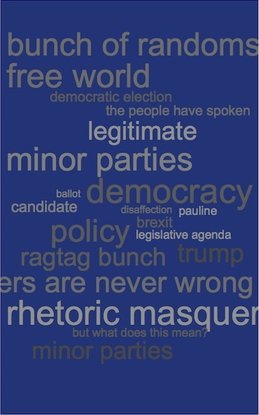
Graham Ring
A turbulent 2016 saw Britain vote to Brexit, and a clutch of their European neighbours veer to the political right. In the US, a man with no experience in the military or the public service is about to become leader of the free world for the next four years.
In Australia, a double dissolution election meant that senate seats could be won for half the usual number of votes. Voters returned a ragtag bunch of minor parties, along with a bewildering bunch of independents including David Leyonhjelm, Derryn Hinch and Jacqui Lambie.
Our much vaunted system of democratic election, means that this result is, by definition, legitimate. The People Have Spoken, and The Voters Are Never Wrong. That said, it’s worth musing about just why the voters made these decisions.
At a superficial level, the answer to this question has been shouted from the rooftops: The electorate is disaffected. But what does this mean?
Australia has enjoyed many consecutive years of economic growth. And our material standard of living is higher than it has ever been, even if the distribution of this wealth is uneven. So why the backlash?
Anyhow, the ‘disaffection’ we vented at the ballot box has seen a bunch of randoms installed in the Senate. Just how this will improve things is not entirely clear. What is apparent is that the government’s legislative agenda will grind to a halt, since nothing can get through the upper house without protracted horse-trading with these liquorice all-sorts.
Our system does not require voters to be informed, only to cast a ballot for a candidate of their choice. Even if it’s Pauline. This is widely believed to be a good thing.
Specific policy detail from the minor parties and the independents was very thin on the ground during the campaign, but that didn’t seem to matter. We voted for them anyway. Apparently we wanted to ‘shake things up’. Now we wait in trepidation for our monster to mature.
Perhaps next time we should invite candidates to make clear and specific promises about what they intend to do if they win office. Then we can make an informed choice based on this information. Or not.
In any case, allowing politicians to let rhetoric masquerade as policy does not serve us well.
Graham Ring is a Darwin based writer and journalist.
A turbulent 2016 saw Britain vote to Brexit, and a clutch of their European neighbours veer to the political right. In the US, a man with no experience in the military or the public service is about to become leader of the free world for the next four years.
In Australia, a double dissolution election meant that senate seats could be won for half the usual number of votes. Voters returned a ragtag bunch of minor parties, along with a bewildering bunch of independents including David Leyonhjelm, Derryn Hinch and Jacqui Lambie.
Our much vaunted system of democratic election, means that this result is, by definition, legitimate. The People Have Spoken, and The Voters Are Never Wrong. That said, it’s worth musing about just why the voters made these decisions.
At a superficial level, the answer to this question has been shouted from the rooftops: The electorate is disaffected. But what does this mean?
Australia has enjoyed many consecutive years of economic growth. And our material standard of living is higher than it has ever been, even if the distribution of this wealth is uneven. So why the backlash?
Anyhow, the ‘disaffection’ we vented at the ballot box has seen a bunch of randoms installed in the Senate. Just how this will improve things is not entirely clear. What is apparent is that the government’s legislative agenda will grind to a halt, since nothing can get through the upper house without protracted horse-trading with these liquorice all-sorts.
Our system does not require voters to be informed, only to cast a ballot for a candidate of their choice. Even if it’s Pauline. This is widely believed to be a good thing.
Specific policy detail from the minor parties and the independents was very thin on the ground during the campaign, but that didn’t seem to matter. We voted for them anyway. Apparently we wanted to ‘shake things up’. Now we wait in trepidation for our monster to mature.
Perhaps next time we should invite candidates to make clear and specific promises about what they intend to do if they win office. Then we can make an informed choice based on this information. Or not.
In any case, allowing politicians to let rhetoric masquerade as policy does not serve us well.
Graham Ring is a Darwin based writer and journalist.

